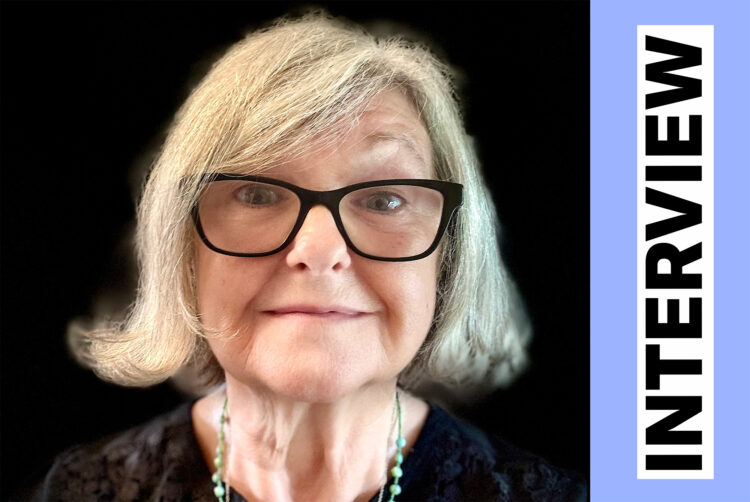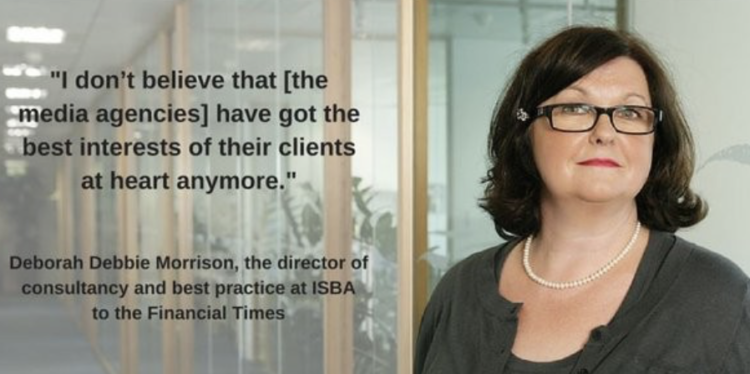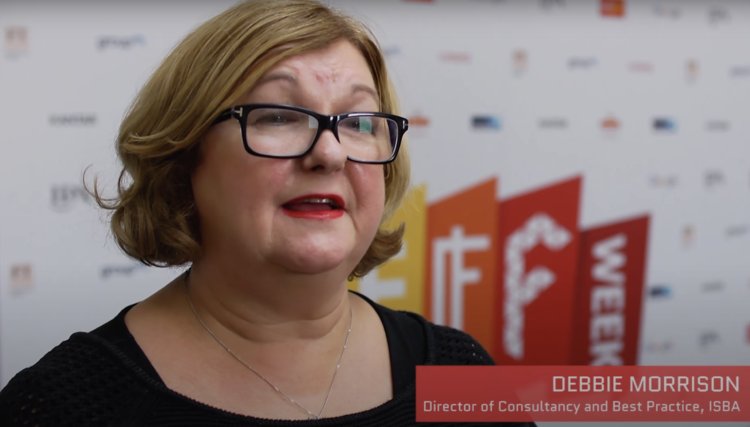Debbie Morrison: The doyenne of due diligence who broke advertising’s ‘good chap’ model

The Media Leader Interview
Debbie Morrison is the driving force behind the advertiser/agency contracts on which today’s media industry still depends. Speaking to The Media Leader on the eve of her retirement, Morrison describes her unique career rooting out bad practice and building a more trustworthy industry.
Debbie Morrison is entering her final day before retirement and feels overwhelmed.
Despite wanting to “just float off into the sunset”, she is feeling emotional, she confides, after collating 18 pages of comments from clients congratulating her on her impending retirement, as well as poring through hundreds of LinkedIn comments responding to the announcement.
“Most of the comments are from people thanking me and so many people are saying how much I’ve inspired them and helped them in their career. And I was like: ‘Oh my god.’
“I’m so shocked, actually — people remember! Some people remembering back, like, 25 years or you know: ‘I remember when you helped me, when I did my MA, and you mentored me, and I was having twins at the time, and I got distinction.’ It’s so nice that people remember, isn’t it?”
No-nonsense legacy
There’s plenty to remember because Morrison has, perhaps in the background, been one of UK media and advertising’s most influential figures of the last three decades.
In various roles at advertiser trade body Isba, Morrison pioneered many of the foundations that today’s media buyers, creatives and marketers take for granted.
As Isba’s director of consultancy and best practice, Morrison became well-known to industry leaders as a straight-talking and no-nonsense figure who could be relied on to give impartial advice to marketers and agency CEOs.
Her tenure spanned the separation of creative and media agencies in the late 1980s and early 1990s, as well as the launch of Contract Rights Renewal, the 2003 law that protects advertisers’ prices on ITV. Her time at Isba culmininated in the creation of a tougher framework for advertisers to use in their contracts with media agencies in 2016.
This is understandably Morrison’s career highlight — these contract templates and best-practice guides form the bedrock of how billions upon billions of advertising pounds are traded in the UK.
“I’m really proud,” she says, ”the model contracts are a legacy left to the industry to build on. They can change and keep being updated as and when new things arise. Look at the rise of in-house legal, who are now taking a really deep interest in the whole area. They weren’t interested when I first started.”
Tougher contracts
They were certainly interested in 2015, when former ad agency CEO Jon Mandel stood up at the US Association of National Advertisers conference to attack bad practices by media agencies in particular.
Whereas media agencies had always justified their value to large advertisers by their ability to negotiate discounts with media owners, the emergent world of online advertising had created another layer of uncertainty in which it was possible to make significant margins between what advertisers were paying them and what agencies were buying from Google, Facebook and other online media sellers.
Isba was compelled to act on behalf of its members. Within a year, Morrison had unveiled a tougher contract template for advertisers to use when inking agreements with, in particular, media agencies, which were accused by Mandel of taking “kickbacks” that were pocketed rather than given back to clients.
This lack of transparency has long been associated with agencies owned by listed companies, Morrison explains: “They have two masters — the clients and the City.”

According to Morrison, she tried to make this point to a Financial Times journalist when promoting the new Isba media services framework in 2016. She was quoted as saying: “Media agencies don’t have clients’ best interest at heart.” She insists that she said agencies don’t always have clients’ best interests at heart — and it was this lack of nuance that resulted in the opprobrium that followed.
GroupM’s then UK CEO Nick Theakstone decried the comment as “an insult to all of the people across our business who work incredibly hard to not only do the right thing by their clients, but also live and breathe their clients’ requirements, requests and challenges”.
Procurement pioneer
The comment stung because when Morrison speaks, advertisers listen.
In 2023, she was named by the World Federation of Advertisers as one of the top 70 most influential industry people in the last 70 years.
Tina Fegent, one of the industry’s foremost procurement experts, describes Morrison as “a trailblazer who transformed the way marketing procurement builds trust and fosters innovation across our industry”.
Fegent tells The Media Leader: “Through her outstanding work at Isba for Compag (the marketing procurement group she set up), Debbie has made a significant impact on UK marketing procurement through her work in promoting transparency and improving collaboration between procurement teams and marketing agencies.
“The wide-ranging industry papers, contract templates, events, guidelines, research projects, industry collaborations, pitching processes, measurement, ways of working… the list is endless of the work and topics that Debbie created.
“Marketing procurement would not be in the place it was today if it wasn’t for Debbie 30 years ago.”
Morrison has just retired from Ebiquity, where she completed a five-year stint as managing director of global partnerships. Ebiquity is now one of several consultancies that offer auditing, pitch management and consulting advice for advertisers.
Having been courted by FirmDecisions (acquired by Ebiquity in 2012) for years, Morrison says Ebiquity eventually “wore me down” to join the business in 2017, a year after that FT article.
She recalls: “They just said: ‘We really want an ambassador who’s known by advertisers, who really understands our business and can help us to develop a deeper dialogue with the client community.’ Which is what I did. I set up client councils. I set up a procurement forum for Ebiquity’s and FirmDecisions’ procurement clients.”
‘Careless’ marketing directors
It’s a far cry from three decades ago, when it was standard practice for advertising to be bought and sold without a contract — let alone a contract that stopped an agency ripping off a client or prevented abusive behaviour from advertisers on suppliers.
Morrison changed all that.
She was there just at the time when Sir Martin Sorrell decided to split full-service agency JWT, which he had audaciously bought 1987 via his nascent company WPP before nearly bankrupting the business with the highly leveraged purchase of Ogilvy in 1991.
Over the next decade, Sorrell engineered a more lucrative operation that would be emulated by rivals Omnicom, Publicis Groupe and Interpublic: JWT and Ogilvy would focus on making ads, while sister agencies — beginning with Mindshare, which launched in 1997 — would plan and buy media.
Suddenly, advertisers were having to buy ad creative and media inventory separately. And they had little clue of what good value was or how to hold these agencies to account for how their money was being spent.
“I worked with a lot of marketing directors who were really careless,” Morrison says, recalling the first phase of her 29-year stint with Isba in the early 1990s.

“I would say: ‘Where’s your agency contract?’ — [they would say] ‘Oh, no, I don’t know where it is. I’ll ask legal.’
“Nobody had it, or maybe there wasn’t even one, or it would get thrown out when one marketing director left and, you know, they just empty the drawer out — and bye-bye contracts!
“Sometimes there would only be an agency that had the contract and sometimes there were no contracts. There’s some global advertisers I know that worked on a handshake. And I said: ‘You don’t actually own the intellectual property rights in any of the work that you’re doing!’”
‘Agencies are going to eat them alive’
Morrison is full of anecdotes that brand marketers and agency heads might feel uncomfortable to hear. Her pioneering stint at Isba, where she created the first best-practice guides for how the industry’s buy and sell side should interact, is replete with stories of incompetence and ineptitude.
When advertisers were compelled to buy marketing services from multiple agencies instead of a single shop in the early 1990s, there were, she says, “a fundamental lack of understanding of commercial realities of a relationship”.
Then, “literally overnight”, Morrison began receiving a “flood of calls”: “All from procurement people who’d been doing things like buying toothpaste tubes or insurance. They didn’t know anything about this area.
“And I just thought: ‘My God — the agencies are going to eat them alive in a negotiation.’ Because they needed to understand how an agency ran, how it made its money, how they worked with their clients.”
So that’s where Morrison came in. As she explains: “Marketeers don’t want to spend hours and hours sorting out the agency contract. So I decided that I would help to educate them.”
She took a band of marketers and their procurement specialists on a roadshow of agencies to demand “honest answers” about how agencies actually make money, how they negotiate and structure fees, and how they draw up their contracts.
The knowledge from those meetings led to calls for procurement to have a formal voice within Isba, thus paving the way for Compag’s formation in 1994.
Isba, which is 125 years old next year, owes its very existence to disputes between advertisers and media owners, Morrison reminds us. The organisation was born as the Advertisers Protection Society in 1900 to help advertisers get relevant and independently audited data on readership so that they could make an informed decision about where to put their money.
Following a case in the 1930s, in which advertisers took a group of newspaper publishers to court, the Audit Bureau of Circulations was created to independently audit news brands’ audiences.
“The start of ABC is really the foundation for Isba,” Morrison says. “To help and guide advertisers where individually they haven’t been able to make a difference, but collectively they could try and change the system for the better.”
Multi-gen living
The young Morrison — who grew up in Leeds and Nottingham, and studied fine art as a degree in Newcastle — would surely not recognise this doyenne of due diligence who is steeped in marketing back story.
Family is a huge part of Morrison’s life. For the last 26 years, she has lived in a big house in the middle of a Devon farming community with her son, her parents, her sister, her sister’s husband and their children.

At home with her dog in Devon; Morrison practises ‘multi-generational living’
That communal lifestyle meant Morrison was working from home before it was fashionable. Since the Covid-19 pandemic, she has worked from home 100% of the time, but even in the “before times” she would spend two days a week in Devon.
Morrison actually owes her connection to advertising to her mother. Every summer, Morrison would work at an ad agency, where her mother was a planner, and it was where she developed a taste for media and advertising.
Already, the younger Morrison was testing the limits of workplace equality for women in media.
“I went to Yorkshire TV to see if I could be a camerawoman. Then I realised that you would have to carry these great, big outdoor broadcast cameras around. And they asked me: ‘Are you good with physics and stuff? Because you need to be able to mend your camera and, you know, do electrical things.’ So I didn’t get that job…”
She then moved to London and secured a short stint at textiles giant Courtaulds — “the biggest supplier to M&S of polyester fabric for knickers” — where she worked with designers such as Jasper Conran and Bruce Oldfield on fabric development. While she admits to being “frazzled” and “not being high-fashion enough” for the role, Morrison was fascinated by that mix of business and creativity.
So why then join a trade association like Isba?
“[While at Courtaulds] I was on Isba’s events committee, because the events industry needed to change. It was all really old-school; nothing had changed in many years. I thought: ‘Oh, I’ll join this committee and see if they can do anything.’”
She eventually joined Isba, where, as marketing manager, she was thrust into the deep end of industry lobbying — a key role for trade bodies whose members demand influence on government policy.
“The first job they gave me was to see the first broadcasting bill through its committee stage in the House of Commons,” Morrison remembers. “They just said: ‘Get in there. Get into the committee. Make sure that the whips get the MPs to air our amendments and report back.'”
She was “completely horrified”.
“The MPs were super bright, but were so irreverent and taking the mickey out of each other. And I just thought: ‘Oh my, these are the people running our country,'” Morrison continues. “And I realised that not many of them in that committee had any understanding whatsoever of the industry or, you know, they relied on the people lobbying them to provide them with the background and the information.
“So they were making decisions on our viewing and our ability to watch commercial television without having any real depth of understanding themselves. So they were just simply relying on that knowledge.”
Media fragmentation
Over time, marketers’ demand for better contract compliance grew as marketing channels fragmented in the digital age. Whole new sub-sectors of agencies — PR, digital, social, influencer — were born to seize on new opportunities to reach consumers on their phones.
Morrison recalls that British Airways was the first advertiser to demand consultancy on direct marketing: “They said: ‘We’ve been given £250,000 by the board to invest in direct marketing. How can we make sure we do it properly?’ And, at that point, there were a million different associations looking at direct marketing things.
“So I then became involved in simplifying that marketplace and we set up the Direct Marketing Association, which is where all of them fed into, just to make it easier and simpler. It was a new category and we wanted it to be a success. We tried to lay the foundation so that whatever anybody did was successful.”
Meanwhile, the ongoing relationship with the government continued. Morrison says: “We had a big, big fight with the government over the consumer credit regulation suggestions. They said they wanted to put verbal warnings on TV commercials for anything related to credit. And it would have added another 30 seconds to everyone’s TV commercials.
“We managed to divert it in TV so that it would be a ‘super’ [superimposed text] rather than a spoken word — but not on radio.”
Advice for the future
What of the industry’s future without Morrison? What advice does she have for the current and future generations?
Try to stay ahead of the curve. As she explains: “Be prepared for it to morph and evolve again and again, because it’s never going to be static, is it? It’s going to always change. Now you’ve got AI and all of that, and how you tackle that in contracts… there’s never a time when there’s nothing to think about.
“It’s challenging for your brain, but it’s always great to understand new things and how they can be applied in the industry to make things better.”
While she admits the industry has been “a bit battered” over the past few years, it’s still a “great industry to work in”.
“You know what, whatever the issues, whatever the problems, [advertising] still knocks spots off other industries,” she insists. “I don’t know what I would have done if I hadn’t gone into advertising. It’s hard work, but it’s interesting. It’s a vibrant industry and I think it needs to attract more good people.”
Indeed, Morrison’s role in professionalising the industry around best practice and more transparent deal-making has been fundamental to how advertising has “grown up” in recent years. It was no longer tenable (was it ever?) to expect “good chaps” who run ad agencies and marketing departments to do all their business on the tennis court or over leisurely lunches at Claridge’s.
Now, in a business dominated by global tech platforms, multinational brands and consolidated agency groups, the size of contracts has never been bigger.
You won’t see Morrison’s name on any of those contracts, but her decades of experience and ingenuity (and maybe even traces of her abundant personality) will live on through them.
Isba’s Origin goes live with real audience data for first time
Nick Manning: the ANA Programmatic Study exposes a ‘car boot sale’ market




